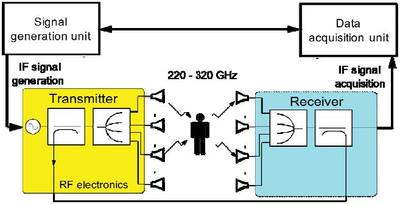Landing and docking in space require imaging and target tracking sensors that can operate independently of the lighting situation and at the same time have good resolution and precise spatial localization with minimum data rates. Millimeter-wave radar sensors and real-time image processing can meet these requirements.
Radar vision in space with real-time image processing and high - resolution structure demands extreme electronics that can not be met currently . Therefore, the use of such sensors in space missions could not be shown yet. The project focuses on the development of new space-qualified electronics for millimeter-wave radar sensor and on the development of radar systems that manage the scarce resources efficiently in space. The tested systems for radar vision are supposed to recognize an object from a distance of 1000 m and present it in 3D from 20 meters . The developed technologies in the project can be directly adapted to other (terrestrial) applications
Within the project we were able to show that the location of a satellite at a distance of up to 1000 m is possible by using a millimeter -wave radar. Simulation results for a demo system at distances up to 20 m show that a nearly artifact- free image with a dynamic range of 30 dB image can be obtained , which means a thinning over a fully occupied system of about 80 %. The demonstration system is to be implemented 32 transmitters and 32 receivers included with adjustable positions to generate the required number of transmitter and receiver combinations . The resulting spatial resolution of the system with 3D imaging will be 30 x 30 x 10 mm. It novel components and architectures for this system have been developed to allow an image reconstruction and processing in minimum time . Experimental results in the field of components for power-output chips at 96 GHz have been demonstrated with an output power of about 40 mW. These values should be increased in the further development to values of about 100 mW. Concepts for efficient signal generation and data processing are being developed based on FPGA.
Partners:
Project Funding
|
 |



